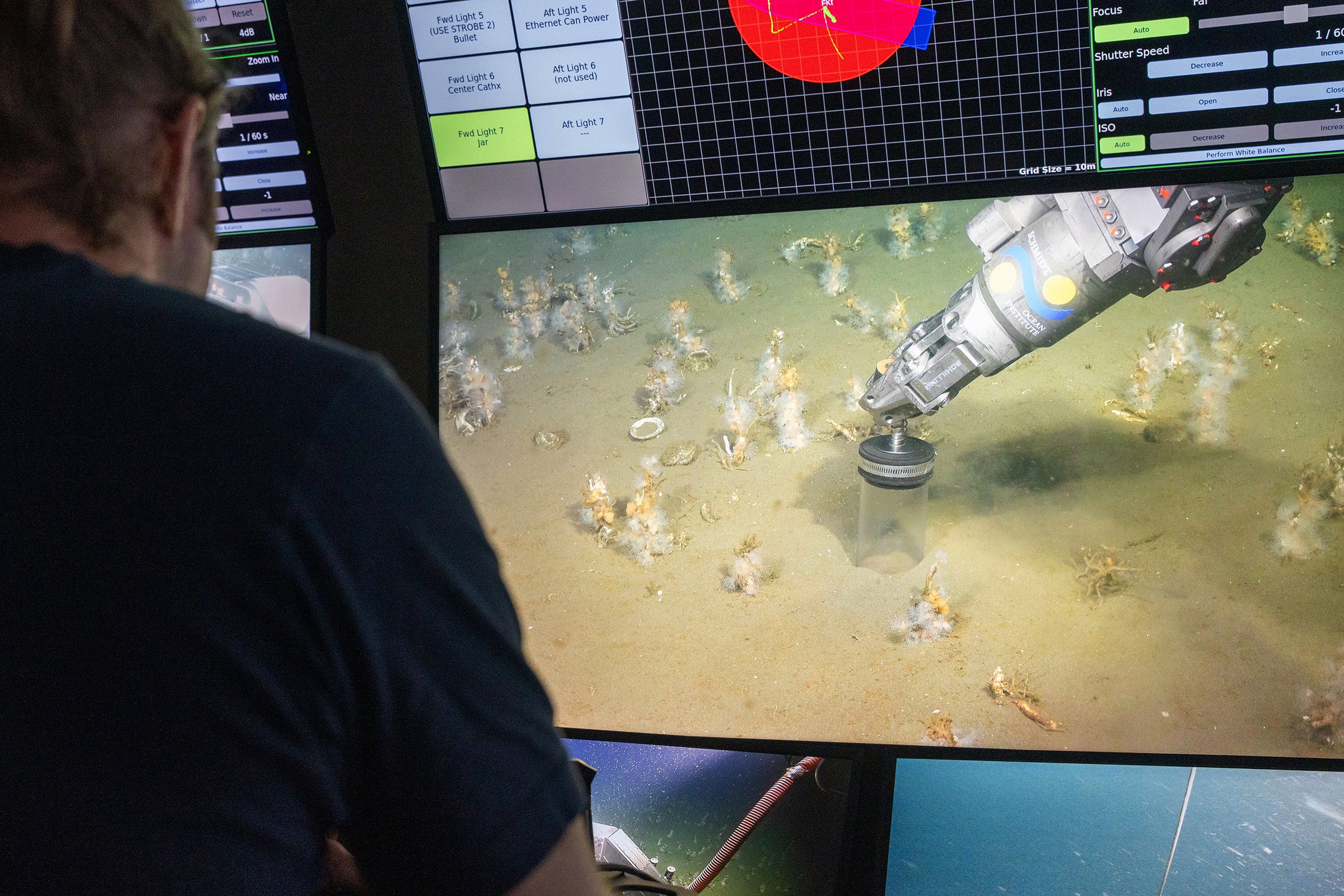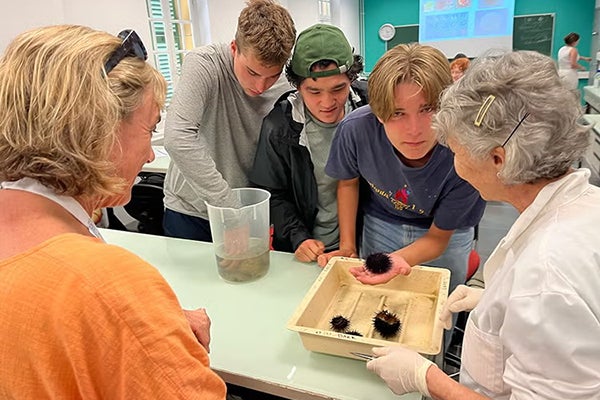When Science Communication Doesn’t Get Through
Climate change, vaccinations, evolution. Scientists sometimes struggle to get their message across to non-scientists.

On the latest episode of the Point of Discovery podcast, what communications research can teach us about why science communication sometimes backfires, and what scientists can do about it.
Today's episode features Emma Dietrich, a PhD student in the Ecology, Evolution and Behavior graduate program at the University of Texas at Austin and a member of Austin Science Advocates. It also features Anthony Dudo, an associate professor in the Moody College of Communication at UT Austin who studies the science of science communication.
TRANSCRIPT
MA: This is Point of Discovery. I'm Marc Airhart. Last year, the Texas State Board of Education was considering revisions to the standards for teaching evolution to high schoolers.
ED: My name is Emma Dietrich and I'm a PhD student in evolutionary biology and ecology here at UT Austin.
MA: Scientists from The University of Texas at Austin were among those testifying about a part of the curriculum that seemed to encourage questioning of Darwin's Theory of Evolution. Dietrich—a graduate student who studies spiders—was among those who went to share their perspectives.
ED: For the last four and a half years, I've worked as a teaching assistant for biology courses at UT. Some of those courses were for students majoring in biology, many hoping to become doctors, nurses or scientists ... I have seen many students succeed, but I've also seen many students struggle, especially with the topic of evolution. And they struggle because they graduated from high schools in Texas that base their curriculum on these confusing standards.
MA: Dietrich is one of a growing number of scientists seeking to share their expertise with the public and decision makers on topics that many find controversial—from climate change to genetically modified foods to vaccinations. She and many other scientists are learning that to get their message across, they have to not only master the science, but also master the art of communication.
MA: Take climate change, for example. According to the Pew Research Center, about half of Americans don't accept that humans are altering the climate, something that 97% of scientists say is the case. Cue the warden from Cool Hand Luke …
[clip from film] "What we've got here is failure to communicate!"
MA: It's not like scientists are keeping quiet. So why do so many people reject the science? Anthony Dudo is an associate professor in the Moody College of Communication at the University of Texas at Austin. He studies the science of science communication.
AD: Public communication isn't as simple as just giving someone information and then magically that information transforms their attitudes and transforms their behaviors-- things unfortunately aren't that simple when it comes to human beings.
MA: Why is that? It seems intuitive, right, that if people don't understand a topic, or feel a certain way, or they believe something that's unscientific, it feels right that if you just explain it to them, they will understand it and change their opinion. Why doesn't it work?
AD: It's a perfectly logical thing to expect. The economic viewpoint would certainly go there as well. The challenge is that the way people process information is really darn complex and really nuanced and often completely illogical. Within the scientific context, especially when we're talking about scientific issues that have a high degree of uncertainty or have a potential political or controversial angle to them, like climate change, people tend to use heuristic filters …
MA: All right, that's a fancy term ...
AD: Shortcuts, [laughs] mental shortcuts to process information. And so think of it as a lens …
MA: And that lens is heavily shaped by a person's political or religious affiliations. In other words, we tend to take on the beliefs of the groups that we identify with. We all have these lenses. We all make quick, subconscious decisions about what's true and what's important, based on biases that we may not even recognize.
AD: And that's why the information itself is not a panacea, it's not a magic bullet. It's one of many different inputs, so to speak, that influences how someone comes to understand and act relative to science -- and that's why having -- approaching that kind of engagement with a sophisticated, thoughtful idea about engagement can help you be aware of the complex ecosystem into which you're wading.
MA: I asked Dr. Dudo if he had any pro tips for scientists who want to communicate more effectively. Especially for those who wade into areas like climate change, evolution, the anti-vaccination movement or genetically modified foods. He suggested doing some homework before engaging the public or reporters or decision makers.
AD: The first thing I will say is that what the scientist is going to do, they need to do it scientifically. Any one-size-fits-all approach to that engagement is doomed to fail. So what that means concretely is understanding ahead of time which audience they're going to engage with, which contexts they're going to engage in and thinking very clearly, once they understand that audience, what realistic goal are they trying to accomplish.
MA: If you're speaking to a group of parents at your local elementary school and you want them to get their children vaccinated, that's an example of a clear goal. Once you've identified the audience and your goals, you have to also figure out what that audience values and what their key concerns are.
AD: So you have to understand where they stand and you have to establish rapport with them first. So people wear "trust detectors." We walk around, whether we realize it or not, sizing up other humans to determine whether we feel safe with them. Think of this in an evolutionary way. It's highly adaptive. We've been doing this for eons. We make sure we're safe.
MA: ... What do you mean by safe?
AD: When we interact with another human, one of the things we do is we try to determine to what extent he or she is credible and to what extent is he or she on our side, are they with us or against us? And typically if you have an expert from on high coming to talk to you, you can see where that particular dynamic I just described may be even more heightened, "This person is privy to information I'm not privy to or this person has a different belief set than the belief set I hold near and dear."
MA: Your audience might perceive the information you're presenting – what seems to you like just plain facts -- as an attack on their personal identity.
AD: And so establishing rapport and common ground, to make sure they understand this person is not a threat, this person respects me and is here to listen to my point of view and then engage me at a level of common ground is really important -- and I would argue is not only really important, it's absolutely critical -- because any meaningful information exchange can only happen once that rapport is established. So to skip that part, and cut to "Here's information, let me cram it down your throat, this is what you need to know to change your views," is never going to go anywhere.
MA: So how do you establish common ground? Starting with values you share in common can help, he says. For example, many scientists facing audiences of climate-change skeptics have learned to talk—not about polar bears and centimeters of sea level rise—but about how climate change will impact the things they really care about—like their air conditioning bills or the loss of crops from droughts and invasive pests—as well as specific solutions, such as clean energy projects that save local taxpayers money. Remember Emma, the graduate student? For her, that meant appealing to a key goal of the Texas State Board of Education—that kids in Texas should leave high school prepared to succeed in college and in their careers.
ED: So if we had all gone up there and just described why creationism doesn't fit into science or why evolutionary biology is correct or something like that, that's been shown again and again that it doesn't help to change people's minds, just presenting them with the same facts over and over again. You have to communicate why it's important that somebody understands biology or appeal to someone's emotions and motivations and their goals in life … and get them to understand why you think it's important.
MA: A few months after Dietrich testified, the board made their final revisions to the standards for teaching evolution in high schools. Some of what the scientists recommended did not get addressed, but the revision reduced the emphasis on questioning the validity of the Theory of Evolution.
ED: Obviously, all change happens in small steps rather than huge leaps. So they modified some of the standards and that's definitely a win.
MA: Regardless of the topic, Anthony Dudo wants to see scientists communicate more effectively with the public. He and his colleagues have been surveying scientists to find out how they feel about communicating with the public, why they do it, and what strategies they use.
AD: We ended up having surveys of 8,000 scientists ... To our knowledge it's the largest sample ever reached of scientists based in the United States. … It's a lovely data set, and we put a lot of time, blood, sweat and tears into it and now we get to pore over it.
MA: The research team discovered several factors that make a scientist more likely to communicate with the public—things like believing that they are good at it, that it will have a positive effect and that their colleagues approve of it.
AD: What we don't find is that a lot of demographic factors influence a scientist's likelihood to communicate more.
MA: So age, gender, ethnicity, field of study – these don't have a big influence on a scientist's decisions to engage with the public.
AD: And that is really, really good news and here's why that's good news: you can't change demographics (laughs) right? You can't change someone's age, you can't change -- those things are not readily changeable, right? But these other things that I mentioned are. So you can have interventions and education and training that can help a scientist improve their communication efficacy. You can help a scientist feel like their interest in communication is more normatively accepted among their cohort. You can connect them with other scientists who want to communicate -- and give them -- and make them feel a sense of community that will embolden their engagement. … and you can teach them about how essentially media and publicity operates so they are more comfortable working in that environment and less intimidated by it.
MA: In other words, science communication is like a muscle, and with practice, almost any scientist can get stronger and better at it.
MA: Point of Discovery is a production of the University of Texas at Austin's College of Natural Sciences. We're on the web at pointofdiscovery.org. Our senior editor is Christine Sinatra. I'm your host and producer Marc Airhart. Thanks for listening!



